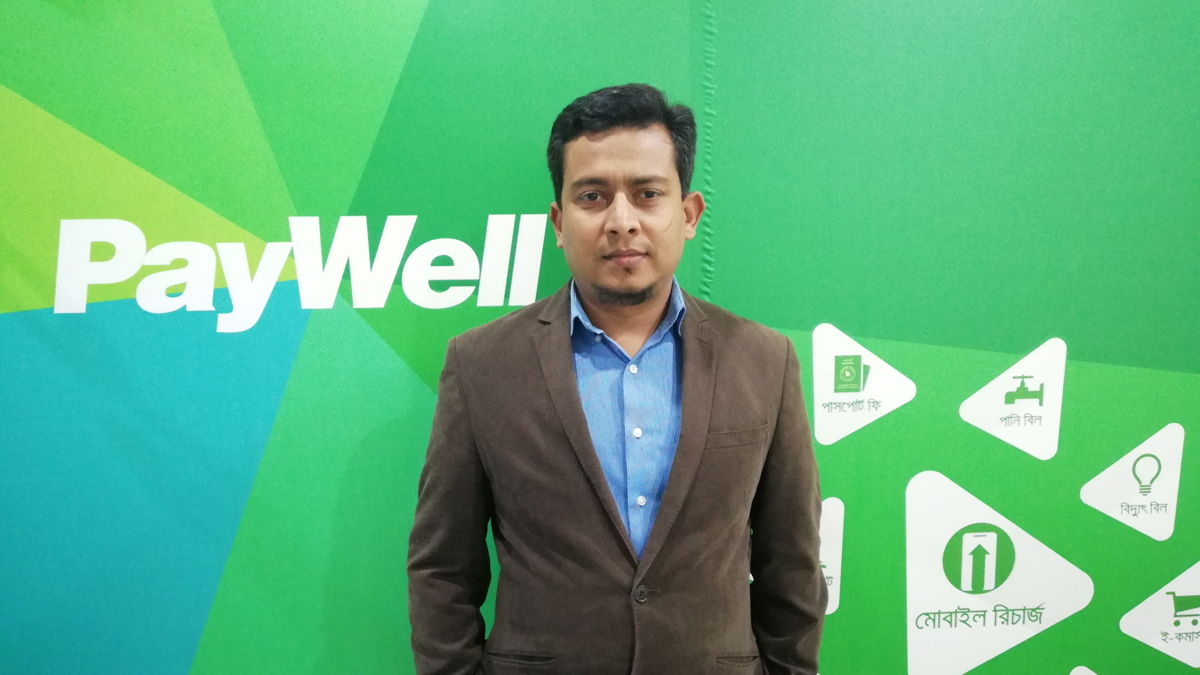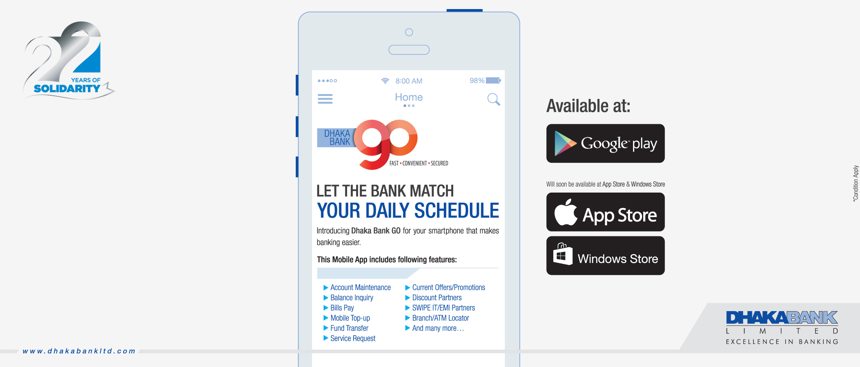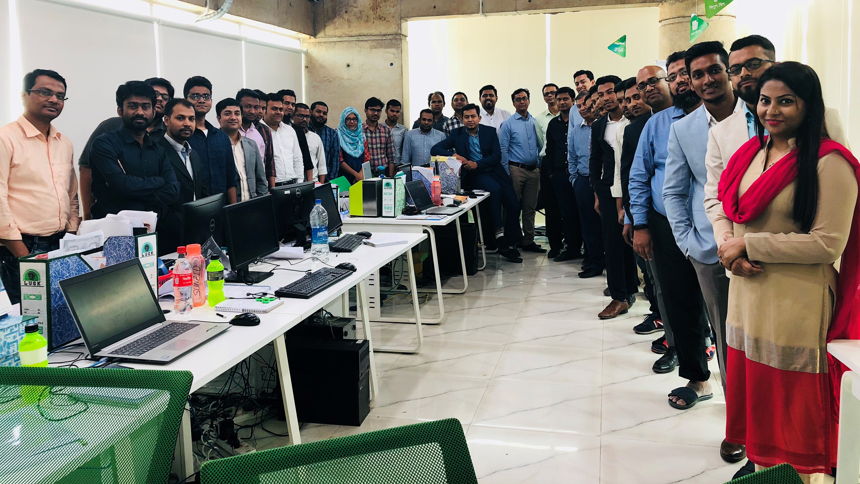
We have been following CloudWell from the beginning of its journey, we first interviewed Mr. Anisul Islam in 2016, you may find the interview here. CloudWell started operation in 2012 with a team of 12 people and 4/5 part-time salesmen. Initially, it was a tall order because as a business PayWell - CloudWell’s flagship product - is an aggregator where it makes money on commission which means the scale is an important factor in its business. So it was not easy initially. Anisul Islam in our first interview: “my partner and I used to look after the entire operations at that time. So it was quite a hectic job for us. We were also trying to persuade service delivery agents on different regions to get onboard with us to reach out to the market, roll our products out, and also earn revenue in the process.”
Since then it has evolved significantly. The team has grown to 110 people. It has added more features to its PayWell platform including ecommerce and now also aggregates MFS services and has significantly expanded its agent network.
In this fascinating interview, Ruhul Kader sits down with Anisul Islam, Founder and CEO of CloudWell, to learn about the developments at CloudWell over the past years and to pick his brain about the strategy of CloudWell, the state of its business and product today and ambition going forward, his take on competition and his biggest lessons from his journey so far as an entrepreneur and contemplates what future may bring for the tech industry in Bangladesh.
Future Startup
Let's start with an overview of CloudWell? Also, how much has PayWell evolved since the last time we had an interview?
Anisul Islam
Around the time we spoke previously, PayWell had just received our Series A investment. Our plan with the investment was to produce a growth momentum. We have been able to streamline our operation with various departments looking at different aspects of it. The market has grown since 2016. The demand for our product has increased and so has the competition.
As for clients, we have with us over 20,000 merchants now which was about 5,000 two years ago. Our product portfolio is more diverse now. We are especially focusing on SME businesses, e.g. manufacturers, traders, wholesalers etc.
To give you a clearer understanding, the local market works in three layers: the manufacturers, the consumers, and those who intermediate between these two - let’s call retailers. Given the incapacitated transportation and logistics network, the intermediaries play a vital role in countries like Bangladesh. They bridge the gap between the producer and the consumer.
Wholesalers and retailers make regular purchases and in fairly large volumes. Since they do business on every corner of the country, payment often appears as a challenge. Say, a retailer from Feni plans to buy products from a supplier/wholesaler in Dhaka. S/he places the order at 12 pm, and the products are readied and shipped within 3 pm, given that payment is made on the retailer part. But before the news reaches the retailer in Feni, it's almost half past three and all bank transactions have been closed for the day. Therefore, s/he can't make the payment although s/he had the intention.
In this way, traditional banking slows down the business. This 'efficiency gap', if we can term it as such, can be reduced if there were a 24-hour payment system available for the retailers and suppliers. Although we can't build a round-the-clock bank in the conventional sense at this instant, we can certainly design interventions that solve this challenge. That’s what we are trying and this is one of the major development at PayWell over the past couple of years.
We are introducing a system what we are calling 'doorstep banking'. The basic idea is to reduce the time taken up by bank transactions which might otherwise be invested in the actual business. With the help of our system, you don't need to physically get to the bank; instead, the bank comes to you. You can run transactions from your workplace or home or anywhere for that matter.
Although it seems a little ambitious at this moment; but our idea has real potential given the growing number of mobile financial service (MFS) users in the country. With 4.5 crores present-day MFS users, we can create an ecosystem that will greatly benefit the intermediaries in the supply chain.
To illustrate how 'doorstep banking' works, let us refer back to our retailer-wholesaler example. Instead of being wary about banking hours, the retailer can pay up the supplier any time s/he wants using our system. Our system will integrate MFS services like bKash that offers 'payment' option besides the regular 'send money' one. This option would enable buyers to make direct payments in lieu of an over-the-counter or peer-to-peer transfer to the sellers. Consequently, the pace of transactions quickens and nothing needs to be put off until the next day.
Currently, around 15% of our 20,000 clients are distributors/suppliers doing business in big wholesalers' markets like Chawk Bazar in Dhaka and Riazuddin Bazar in Chittagong. They use our mobile app-based solution to receive and make payments. We also provide our service to the retailer with the complimentary-product which is used to make payments.
We have integrated bKash and are in the process of integrating Rocket, MyCash, MCash, and UCash as our MFS partners, for now. You may ask at this point, why aren't bKash and Rocket doing the same thing what we are doing on their own? The main reason is that we are offering a unified MFS payment acceptance platform to our merchants who can receive payments from any of the existing MFS account holders. The merchant will only need a bank account where all his/her accumulated payments of a given day will be transferred to his/her bank account the following day.
We connect users' bank accounts with PayWell accounts and ensure that the payments made by a buyer end up in the seller's bank account. It's purely cashless in nature. It helps local retailers and wholesalers to better manage their bank transactions which eventually grows their credibility rating making them eligible for loan requests if they so choose.
Apart from our regular operations such as bill payment, mobile phone top-up, ecommerce integration, this is one of the significant developments that we are very proud of.

[su_divider top="no" divider_color="#adacab" link_color="#edde29" size="1"][/su_divider]
A Message From Dhaka Bank Limited
INTRODUCING DHAKA BANK GO - LET THE BANK MATCH YOUR DAILY SCHEDULE
Dhaka Bank Go gives you secure access to your Dhaka Bank Accounts and Credit Cards and other exciting facilities from your mobile devices anytime, anywhere. Explore and enjoy the infinite opportunities. Learn more here.
[su_divider top="no" divider_color="#adacab" link_color="#edde29" size="1"][/su_divider]
Around the time we spoke previously, PayWell had just received our Series A investment. Our plan with the investment was to produce a growth momentum. We have been able to streamline our operation with various departments looking at different aspects of it. The market has grown since 2016. The demand for our product has increased and so has the competition. As for clients, we have with us over 20,000 merchants now which was about 5,000 two years ago. Our product portfolio is more diverse now. We are especially focusing on SME businesses, e.g. manufacturers, traders, wholesalers etc.
Future Startup
You are partnering up with MFS and banks and integrating their application programming interfaces (API) into your system. What happens in case of such banks that don't have an API?
Anisul Islam
When the sender (or receiver) has an account in a bank that doesn't have an API we simply transfer the payment money online. We aren't charging anything for online transfers. Our existing partner banks are assisting us in this regard.
We use the real-time gross settlement (RTGS) system to make transfers from one bank to another in real-time. This is an interoperable function that establishes the connection between different financial platforms.
Our key concern is to minimize the time occupied by unproductive tasks. To that effect, we are also offering payment options for online transactions, bus and airline ticket purchases, utility bills and the likes.
Future Startup
It's clear that your ambition is to become an aggregator. But how does your new offer 'doorstep banking' is connected with the overall ambition of the company and what is the leverage for you there?
Anisul Islam
With this service to this specific group of users, we have accelerated the transaction process to a considerable extent. It helps both the retailers and the wholesalers with their businesses, especially for the later ones. And it allows growing our business volume relatively rapidly than what we are seeing in the pure consumer level through B2B model.
It is because sales volume for wholesalers is mostly in tens of thousands of taka. So, with a fast payment system, they can generate more revenue in a certain period than they used to do previously. And this is not just a hypothesis. The results are already visible. We have done that already for a lot of clients.
Wholesalers who are using our service have already got a taste of its advantages. That's why the phenomenal growth we have seen in the last six months is largely attributed to our wholesaling merchants. We aim to reach even further growth by creating a solid partnership with all MFS providers and we are already working on it.
We began initially with mobile airtime and Polli Biddut bill payments. Now, we offer ticket purchase for trains, utility bill payments for DESCO, DESA, and Dhaka WASA, and e-commerce payments. Besides, we also facilitate payment for Indian VISA application processing fee. We are regularly adding new features and products to our list.
Future Startup
How big is your team now?
Anisul Islam
We are a team of 110 people currently, most of whom work in the sales team. The second biggest is our technology team which has around 20 people and we have a handful of people in our accounts and customer care team.
Future Startup
Can you please give us an overview of the product, what does your product look like now? What is your business model now? You get a commission on every payment made through your platform. The last time we spoke, we spoke about an aggregator where you aggregate all services and then people can pay through your technology. How much has the product evolved and where is the product now. For clarity, let me read from your last interview to you: “Simply put, we are the distributor for the mobile companies. We receive a commission for every transaction we make from the respective telco. The commission we receive is then shared with our retailers. We are applying that same model for other services like bill payment, train/bus ticketing etc.” How many products are now on your platform?
Anisul Islam
We began initially with mobile airtime and Polli Biddut bill payments. Now, we offer ticket purchase for trains, utility bill payments for DESCO, DESA, and Dhaka WASA, and e-commerce payments. Besides, we also facilitate payment for Indian VISA application processing fee. We are regularly adding new features and products to our list.
As I mentioned earlier, we are now aggregating MFS payment for our wholesale and retail users so that they can make and receive payment without wasting time in maintaining banking schedule. We are also working with banks to integrate into our system to make payment easier for our users.
Our product continues to evolve, for instance, we are now working with a handful of ecommerce companies to work as their distribution channel and our work there is just getting started.
At present, we administer around 60,000 transaction per day which is four times than the last year. We aim to reach the one hundred thousand milestones within the next quarter.
PayWell have been able to build a good network of agents in the suburban and rural areas. You'll agree that e-commerce businesses haven't succeeded in penetrating these areas due to a lack of trust among the constituency.
Future Startup
What are plans regarding e-commerce businesses?
Anisul Islam
We have plans to partner with more e-commerce companies as we go forward. Currently, we are working with AjkerDeal. The current application provides the user with a web-view of where s/he can access AjkerDeal's website, place orders and make payments from their PayWell account as they purchase. But this process is a bit slow. We are trying to make it faster by embedding the AjkerDeal app itself in our app.
We would follow the same approach with other e-commerce platforms as well. In this way, the PayWell app will become sort of a super app which will remain central to the process.

Future Startup
So, the user will be able to shop from different e-commerce websites using your app. Do you see any conflict of interest given that every company wants to control the demand?
Anisul Islam
On the surface, yes, there may be a slight conflict of interest. But when you dig deeper, you will see that our services are complementary to each other.
PayWell has been able to build a good network of agents in the suburban and rural areas. You'll agree that e-commerce businesses haven't succeeded in penetrating these areas due to a lack of trust among the constituency.
With the advocacy of our agent, we can eliminate the credibility problem and encourage people to purchase from online shops. People will find it easy to believe the agents who are from their respective communities and when these agents show a better way to buy products they won't hesitate.
Through our strategy, we are serving various ends. We are building awareness about the new ways of business and in the process helping e-commerce businesses like AjkerDeal to grow.
Future Startup
How does your revenue model work? You charge commission and then share it with your agents, is there any uniform commission rate you charge?
Anisul Islam
No, we don’t have a uniform commission structure yet, we charge varying rates depending upon the transaction. For instance, we take an additional service fee for railway tickets which is divided between the agent and us; the same goes for the utility bill payments.
In case of business transactions, we charge the receiver (e.g. wholesalers) a certain amount for using our system that ensures faster payment that covers our operational costs and charges of our MFS partner.
Future Startup
How are you doing business-wise?
Anisul Islam
In terms of number, we are nearing our break-even point. As I mentioned earlier, our transaction volume and value both have increased over the past months and going forward our aim is to increase our total transaction value by three times in the next few months.
Future Startup
How do you plan to do it?
Anisul Islam
We believe that the partnership with the financial institutions will prove to be very beneficial for our merchants, these merchants are mostly going to be in large wholesale hubs of the country.
Within June this year, we hope to get at least 25,000 clients aboard and 10,000 of that client base would be wholesalers who contribute most to our transactional value.
Future Startup
How does marketing and communication work for PayWell?
Anisul Islam
I'm not really a fan of above-the-line communication. We do a lot of below-the-line communication.
On digital platforms, our marketing activity mainly centers on Facebook. We also do in-store promotions to attract customers.
Having said, we do not focus much on traditional marketing since ours is a B2B model of business. We mostly work directly with our customers.
Future Startup
What do you think about the competition? MFS platform like SureCash, bKash, and iPay can tap into the same area that you're doing business.
Anisul Islam
Honestly, I don't see them as competitors. Rather, we want to collaborate with them. The thing that would matter in the future is the size of the client base someone has got. The company with the largest clientele will lead the market. This is why we are trying to grow our operation by increasing the number of wholesalers instead of retailers.
Add to that, the MFSs are still too consumer-focused. So, we have a lot to accomplish in our area. In future, with the friendly regulatory environment, we hope to focus on consumers as well.
Going forward, we have to strengthen our client base to morph into a B2C model. In that respect, we are looking forward to acquiring a license from Bangladesh Bank which would allow us to introduce an app for individual consumers to make payments using QR codes, NFC, and the likes. The consumer application can be used to pay utility bills, make purchases from e-commerce sites, and many other things. It will be a separate app from the PayWell one. The market still needs to mature a bit to roll out an application like this.
-
Notes
1. Interview Ruhul Kader, Transcription by Sheikh Rahatil Ashekan
2. Further reading on CloudWell including an earlier interview with Anisul Islam here.
[su_note note_color="#ffffff" text_color="#050a45" radius="15"]This story is made possible in part by our friends at Dhaka Bank, whose generosity enables us to publish premium stories online at no cost to our readers. Dhaka Bank has introduced an excellent mobile banking app, Dhaka Bank Go. Dhaka Bank Go gives you secure access to your Dhaka Bank Accounts and Credit Cards and other exciting facilities from your mobile devices anytime, anywhere. Explore and enjoy the infinite opportunities. Learn more here.[/su_note]
